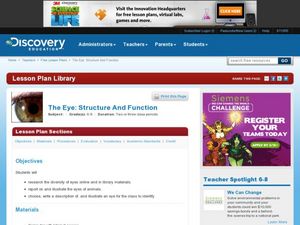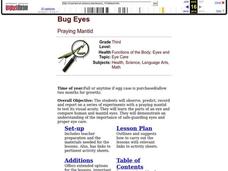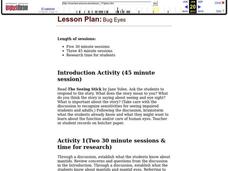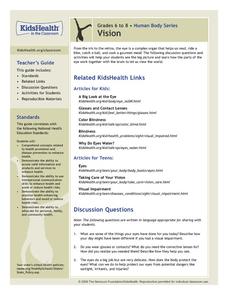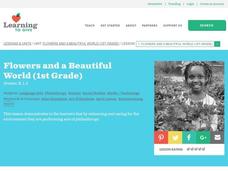Curated OER
Eyes On Me
Students investigate the human eye. In this biology lesson, students read the book Look At Your Eyes and locate the various parts of their eye. Students play the game "I Spy."
Curated OER
The Eye; Structure and Function
Students research the structure and function of the eye. In this anatomy activity, students write a report about the eye and draw an illustration. They research a particular animal's eye then present their findings to the class without...
Curated OER
The Human Eye
In this reading comprehension worksheet, students learn about the human eye by reading a 2 page passage and studying a diagram of the eye. Students answer 8 questions, and label a diagram of the eye.
Curated OER
Bug Eyes
Third graders observe, predict, record and report on a series of experiments with a praying mantid to test its visual acuity. They study the parts of an eye and compare human and mantid eyes.
Curated OER
Eye Care
Students list different ways of caring for their eyes. They collect magazine photos of people wearing glasses. Organize eye exams for the class. They ponder the consideration that wearing eye wear protects one's eyes.
Curated OER
Healthy Eyes and Low Vision Care
Students explain how eyes function, how to prevent eye problems, the types of refractive errors, and the common low vision and eye disease problems. They receive professional development points upon successful completion of an assessment.
Curated OER
Fish Eyes Lesson Plan
Students practice counting and matching quantities using paper fish. In this early mathematics lesson, students create a fake fishing pole and attempt to identify numbered paper fish they acquire from a bucket. Students read...
Curated OER
Bug Eyes
Students explore mantid eyes and human eyes. In this mantid eyes and human eyes research lesson, students work in small groups to gather information. Students read books, observe mantids, and do experiments. Students then present their...
Nemours KidsHealth
Vision
From the iris and retina to glasses and contact lenses, learners will be excited to see what activities are in store for them as they learn about the complex organ of the human eye.
Curated OER
Eye Safety
Tenth graders become aware of the need for eye safety in the classroom through three mini labs.
American Chemical Society
From Gas to Liquid to Solid
From gas to liquid condensation to solid frost, water undergoes phase changes before young scholars' eyes! Using ice, salt, water, and a metal can, they set up an investigation that can be used in a physical science setting, or as part...
American Chemical Society
Curious Crystals
Crystals are more than meets the eye! Can learners tell them apart simply by observation? As they examine five samples with a magnifier, they find that appearance alone is not enough. This serves as an introduction to a mini unit on...
Nuffield Foundation
Investigating How We See Colour
Can you eyes be fooled into seeing colors that aren't actually there? Budding scientists view a presentation that addresses this topic. They explore how their eyes interpret color through the retinas and messages sent to the brain. They...
Cold Spring Harbor Laboratory
Sex Cells Have One Set of Chromosomes; Body Cells Have Two
What's the difference between body cells and sex cells? Learners explore the question and the process of meiosis using an interactive lesson. An animation describes the discovery of meiosis and describes its phases for a detailed and...
Curated OER
Flowera of the Prairie
Students with severe disabilities view pictures of flowers in a scanning box and identify them. Outside, they locate flowers on the school's property, label and care for them. Students use flower pictures to aid identification.
Curated OER
People of the Desert
Students study the importance of caring for desert water sources. In this desert lesson, students investigate water resources that are available in deserts. They listen to a read aloud about the Sonoran Desert before working in groups...
Curated OER
Testing Leaves for Starch: the Technique
Like good scientists, kids often want to see first-hand why things are as they are; they can do just that in the starch-testing photosynthesis activity found here. Depending on the age of your pupils, you may wish to do the investigation...
Curated OER
Bible (Day 7) Redemption and Caretakers
Whether you are religious or not, humans can be caretakers of the Earth. Students will discuss recycling, how their wasteful actions effect the Earth, and the Alaskan oil spill. They then have small group discussion and write about how...
Curated OER
For Your Eyes Only
Students identify two major types of visible pollutants, smog, and particulate matter, They explain that air pollutants are generated during incomplete combustion. They measure and rank collectors from the most pollutants to the least...
Curated OER
Earth: The Apple of our Eye
Students are led through a demonstration in which they cut open an apple, which represents the earth. They follow through the hands-on instructional activity, cutting the apple into various portions--each representing some aspect of the...
Curated OER
Dogs
The 36 slides in this presentation will keep your students' attention with the flashy colors, fonts and cute pictures of puppies. The information is mostly about which breeds of dogs are best suited for particular jobs and...
Curated OER
Flowers and a Beautiful World: Earth Day (1st)
Students consider caring for their environment. For this environmental stewardship lesson, students read Miss Rumphius and discuss how sharing their time, talent, and treasure through volunteering makes the world better.
Curated OER
Trout Cookies
Students explore the external anatomy of a fish. In this anatomy and adaptations lesson, students look at an image of a trout and identify its various external features including fins, eyes, spots, parr marks and lateral line. Students...
Curated OER
Light and Vision
Students explore how light affects vision. In this light lesson, students construct a shoe box model to represent an eye. Experiments are performed with various light sources. Students draw conclusions about how the eye works as they...



